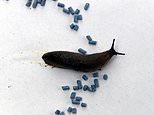Slug pellets are outlawed from today… so gardeners are advised to kill them with BEER instead
Slug pellets are outlawed from today… so gardeners are advised to kill them with BEER instead
There is now a ban on slug pellets, which have been used since the 1940s
Gardeners looking to protect their plants are advised to use beer to trap themSlugs are 64 times more likely to be caught in a trap containing lager than water
<!–
<!–
<!–<!–
<!–
(function (src, d, tag){
var s = d.createElement(tag), prev = d.getElementsByTagName(tag)[0];
s.src = src;
prev.parentNode.insertBefore(s, prev);
}(“https://www.dailymail.co.uk/static/gunther/1.17.0/async_bundle- -.js”, document, “script”));
<!–
DM.loadCSS(“https://www.dailymail.co.uk/static/gunther/gunther-2159/video_bundle- -.css”);
<!–
They have been used against the slimy vandals of the vegetable patch since the 1940s.
But from today gardeners are banned from putting out slug pellets to tackle the pests.
Instead, they will have to rely on beer to kill the slugs that are targeting their prized vegetables and flowers.
Slug pellets contain metaldehyde, an organic compound that is toxic for slugs and other gastropods.
But metaldehyde slug pellets can no longer be sold or used in the UK because they can poison animals that eat the slugs, such as hedgehogs, birds and even dogs.
Slug pellets can no longer be used or sold in the UK, as they can poison other animals like birds and dogs
To make a slug beer trap (pictured), dig a hole in the garden, fill it with a container full of beer (preferably lager) and wait for the slugs to slip in. Don’t forget to empty the trap regularly
Experts from horticultural charity Garden Organic say that slugs’ love of lager makes the drink the tastiest way to trap them.
Slugs are 64 times more likely to be caught in a trap containing lager than water, an experiment by the charity found.
Bitter is 53 times more effective than water and the gastropods will go for any beer brand, researchers found. But they will reject other alcohol including red and white wines, Cava and cider.
Garden Organic’s findings came from 166 citizen scientists sinking glasses containing the different drinks below the soil surface for its ‘slug pub’ research project.
‘Slugs love lager,’ said Emma O’Neill, the charity’s head gardener.
‘Many gardeners know that slugs are confirmed lager louts and their love of this tipple can certainly distract them from your plants. The smell of lager and bitter really seems to attract them.’
The charity also suggests using copper tape to protect plants from slugs or luring them underneath an old roof tile with a piece of lettuce.
It recommends raised beds and containers to deter slugs, which tend to love munching hostas and delphiniums while leaving foxgloves and geraniums alone.
According to gardeningknowhow.com, an inexpensive beer substitute can be mixed up with common kitchen ingredients, for those who don’t want to give their precious beer to slugs.
Recently slugs and snails were no longer classed as pests by the Royal Horticultural Society, as they help to recycle dead leaves and other plant matter
A mixture of yeast, flour, sugar and water will be just as effective as killing slugs with beer, it claims.
According to the Government, alternative methods of pest control also include cultural techniques like planting slug resistant crop varieties, selectively timing irrigation and harvest and sowing seeds more deeply into the soil.
The ban on slug pellets goes back more that three years – in 2018, a ban on their use was first announced by then Environment Secretary Michael Gove, following advice from the UK Expert Committee on Pesticides and the Health and Safety Executive that they pose an unacceptable risk to birds and mammals.
But the decision was successfully challenged in the High Court by slug pellet manufacturer Chiltern Farm Chemicals after the Government conceded its decision- making process had been flawed.
Announcing a new phased ban in September 2020, Farming Minister Victoria Prentis said: ‘The scientific evidence is clear – the risks metaldehyde poses to the environment and to wildlife are too great.’
Eighteen months on, it is finally illegal to sell or use metaldehyde products in the UK.
Garden Organic chief executive Fiona Taylor said that the outright ban has been ‘a long time coming’.
The smell of lager and bitter attracts slugs and can be used to trap them, as an alternative to slug pellets which have now been banned (stock photo)
‘Metaldehyde pellets have long been recognised as posing an unacceptable risk to birds and mammals,’ she said.
‘There have been cases of dogs ingesting pellets, leading to sickness and even death.
‘Toxins can also find their way into rivers and freshwaters, posing wider harm to the environment and other wildlife.
‘We are pleased that the government has listened to safety and environment experts about the huge risks of this chemical, which far outweigh any benefits.
‘We hope this is the start of a range of measures which sees an end to the use of harmful pesticides.
‘If we care about wildlife and the future of our planet, we must make the positive move to organic, environmentally friendly methods for our gardens, allotments, balconies and pots.’
![]()


